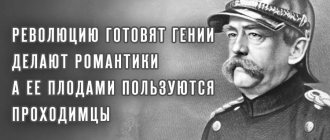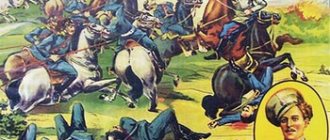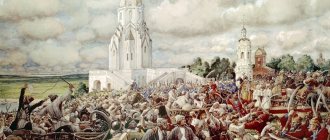The first Chancellor of the German Empire, later nicknamed the “Iron Chancellor,” knew Russia and the Russian people very well.
In this article we will give as an example the opinion and thoughts regarding Russia of one of the wisest German chancellors. And we will once again be convinced of how strong Russia is, unbroken and never conquered by anyone.
The history of Russia's relationship with the Iron Chancellor began with the support of his candidacy by Russian diplomacy, assisting him in matters of the unification of Germany. And she supported it because she saw in Germany a powerful counterbalance to Russia’s most important enemies - England and France, who defeated Russia in the Crimean War. That’s why they supported Bismarck in everything.
This was facilitated by Bismarck’s close friendly relations with the Russian Chancellor Gorchakov, who was not only a friend to Bismarck, but also a mentor. How correct the policy was is a separate question and has not yet been resolved.
Bismarck knew the Russian people well and lived in Russia for several years. And he held very definite views both on us and on our state.
He believed that under no circumstances should one quarrel with Russia, much less fight. In the difficult situation of the 19th century, he foresaw the possibility of Russia and Germany being drawn into war due to membership in different coalitions, but he always fought against such a possibility, being somehow confident that Germany would never, as such, become the object of aggression from outside Russia.
In one of his letters addressed to the Austrian envoy, Bismarck very precisely expresses his attitude towards the Russians, and warns that “it is better not to wake up the Russian bear.” Here is Bismarck's well-documented opinion:
“Even the most successful outcome of the war will never lead to the collapse of Russia, which rests on millions of Russian believers of the Greek faith. These latter, even if they are separated as a result of international treaties, will reconnect with each other as quickly as separated droplets of mercury find their way to each other.
This indestructible State of the Russian nation is strong due to its climate, its spaces and its unpretentiousness, as well as through the awareness of the need to constantly protect its borders.
This State, even after complete defeat, will remain our creation, an enemy seeking revenge, as we have in the case of today's France in the West. This would create a situation of constant tension for the future, which we would be forced to take upon ourselves if Russia decides to attack us or Austria. But I am not ready to take on this responsibility and be the initiator of creating such a situation ourselves.
We already have an unsuccessful example of the “destruction” of a nation by three strong opponents - the much weaker Poland. This destruction failed for a full 100 years. The vitality of the Russian nation will be no less.”
Other statements of Bismarck about Russia and Russians
• Preventive war against Russia is suicide due to fear of death.
• Russia is dangerous due to the meagerness of its needs.
• The Russians cannot be defeated, we have learned this for hundreds of years. But Russians can be instilled with false values and then they will defeat themselves.
• Even the most favorable outcome of the war will never lead to the disintegration of the main strength of Russia, which is based on millions of Russians.
• Don't expect that once you take advantage of Russia's weakness, you will receive dividends forever. Russians always come for their money. And when they come, do not rely on the Jesuit agreements you signed, which supposedly justify you. They are not worth the paper they are written on. Therefore, you should either play fairly with the Russians, or not play at all.
• He, as always, has a prima donna smile on his lips and an ice compress on his heart (about the Chancellor of the Russian Empire Gorchakov).
• Never fight with Russians. They will respond to your every military stratagem with unpredictable stupidity.
• Make alliances with anyone, start any wars, but never touch the Russians.
• Russians take a long time to harness, but travel quickly.
“Never go to war with Russia...” A quote attributed to Otto von Bismarck often replaces a close analysis of his personality. In our country, depending on relations with Germany, they liked to attribute to him the traits of either an ardent Russophobe or an ardent Russophile. Today, behind these layers, it is almost impossible to discern the real person and the motives for his actions. Let's try to figure them out.
The year of Bismarck’s birth is 1815: the year of the Battle of Waterloo and the Congress of Vienna, on the one hand, a time of change, and on the other, the restoration of the old order, the resumption of the “concert of the great powers.” Three of them - Austria, Prussia and Russia - form the Holy Alliance, to which they will be faithful as long as the future chancellor grows and matures. His childhood was probably accompanied by conversations in living rooms about the joint struggle of Frederick William III and Alexander I against Napoleon, and part of his upbringing, quite possibly, were didactic stories about the Battle of the Nations near Leipzig, where Russian and Prussian regiments went into battle together.
Many biographers of Bismarck note his penchant for leadership since his student days, sober calculation and a very cool attitude towards national democratic ideas that were widespread at that time. “I, brought up in the Prussian spirit, was disgusted by the violent encroachment on state order [1]” - this is how Bismarck writes about the uprisings of German republicans before the revolution of 1848. However, he was ready to defend the monarchy with new methods that went beyond the loyal principles of that time. This will become clear already at the beginning of his political activity - December 3, 1850, when, as a member of the Landtag[2], he defended the Olmütz Agreement from the rostrum[3]. Its signing meant Prussia's cession of leadership in the German Confederation to its eternal enemy Austria, with the direct support of Nicholas Russia. The liberal public shouted about “humiliation”, denounced dynastic solidarity with all its might and demanded to declare war on Russia. In his speech, Bismarck not only made it clear that any war now would be disastrous for Prussia and that there was no “worthy booty” in the East, but also formulated his credo: “The only healthy basis for a large state... is state egoism, not romance[4] " It is this state egoism that will determine the attitude towards Russia throughout the rest of Bismarck’s political career.
Later, representing Prussia at the all-German level, in the Bundestag in Frankfurt am Main, Bismarck would not see the point in turning bayonets against Russia and in the Crimean War, this time attributing it to the benefit of Prussia itself. He managed to reject the Austrian project of entering the war, and after its end he supported the alliance of Russia and France, who had recently fought with each other, against Austria. All this was done with a simple calculation - to exclude Austria from the process of unification of German states along the “Great German” path and to promote a similar “Little German” one, that is, unification under the auspices of Prussia.
In the beginning. On March 1859, Otto von Bismarck was appointed to St. Petersburg. By that time, he already had diplomatic experience and was considered in society to be part of the “Russophile” circle under the king. Having traveled a long and not the most comfortable journey (there was no railway between Berlin and St. Petersburg at that time), Bismarck found himself in the Russian capital, where he was very warmly received by the emperor and high society. Russia needed to get out of the political isolation in which it found itself after the Crimean War. The basis of Russian foreign policy at that time was the desire to weaken Austria, which completely coincided with the aspirations of Prussia. At the same time, anti-Austrian sentiments were very strong in Russian society. When Prince Vladimir Dolgorukov showed Bismarck one of the Moscow libraries, they met a servant who had the Kulm Cross on his chest, which he received for participating in the battle of the same name [5]. The Prussian envoy praised him for his cheerful appearance and asked who he would go to fight with now. “Always against Austria... An honest enemy is better than an unfaithful friend[6],” the servant replied, meaning that Austria, which was Russia’s ally in the Napoleonic wars, abruptly changed its course later.
Many stories about Bismarck's attitude towards Russia have acquired the character of apocrypha. In particular, the story of a ring on which his favorite Russian word “nothing” was engraved. He really loved this word, which in 1862 he heard from a peasant who was taking him on a royal hunt, and which struck him with the breadth of its use and “magical power” among the people[7]. But in fact, the story of Prince Bismarck’s “ring” first dates back to 1885, when he told it to a certain diplomat, and after that the rumor was reprinted first by German and then by American newspapers. Subsequently, the prince only clarified that it was not a ring, but a small seal.
In the fall of 1862, Bismarck faced another appointment: this time he took up the much more important post of Minister-President, that is, the head of the Prussian government. On January 10, 1863, the Polish Uprising began in the western part of the Russian Empire, which Bismarck immediately used for political purposes. On February 8, the so-called Alvensleben Convention was concluded, named after Adjutant General Gustav von Alvensleben, who was sent to St. Petersburg. The convention allowed Prussian and Russian troops to freely cross the border of both states when pursuing rebels. Despite the fact that by this time the uprising had actually been suppressed, and the convention itself had not been ratified by the Prussian parliament, it solved an important problem. This document served to form an informal coalition of France, Britain and Austria directed against Russia, which was very reminiscent of the situation during the Crimean War. Thus, the planned Russian-French rapprochement was eliminated. Emperor Napoleon III planned to convene a pan-European congress on the Polish issue, which England and Austria did not want. As a result of disagreements, England and France were unable to act together in the “war of dispatches” against Russia. In this situation, strengthening the weakened ties between Russia and Prussia after Olmütz looked very valuable.
The “cleared rear” and the lack of a pan-European consensus allowed Bismarck to begin the main task of his life - the unification of Germany. As is known, it was accomplished with the help of three wars: Prussian-Danish, Austro-Prussian and Franco-Prussian. During the first of them, which ran from February 1 to October 30, 1864, Russia maintained neutrality. After all, very little time had passed after the final suppression of the Polish uprising, and besides, the Great Reforms of Alexander II were in full swing.
The result of the Austro-Prussian War of 1866 was a significant strengthening of Prussia. Even during the war, this caused both a protest in the Russian press and a negative reaction from the Russian Foreign Ministry. Alexander Gorchakov expressed his opinion this way: it would be better if “the agreement between the two great German powers was not violated, because we could not take the side of one without throwing the other into the arms of our opponents[8].” He made it clear to his Berlin colleagues that the methods that Prussia uses in internal German politics “rule out the possibility of a close rapprochement[9]” with Russia. The plans of Russian diplomats included holding a pan-European congress on the German question. The excitement was extinguished after in August, after the signing of the Nikolsburg Truce with Austria (July 26, 1866), General Edwin Karl von Manteuffel was sent to St. Petersburg. The latter, during an audience with Emperor Alexander II, promised from the Prussian side assistance in the abolition of the neutral status of the Black Sea in exchange for Russian non-interference in internal German affairs.
The Franco-Prussian War finally shook the balance of power in Europe. Modern historians increasingly call this conflict the Franco-German War, because out of hatred for France, Bismarck managed to mobilize almost all German states for the war. Beginning on July 19, 1870, it quickly revealed the weakness of the army of the Second Empire, which was retreating further into the interior of the country. The defeat at Sedan on September 1, 1870 freed Russia's hands. On October 19, a circular dispatch from Foreign Minister Alexander Gorchakov was sent to the European powers, which stated that Russia was lifting the restrictions imposed on it after the Crimean War. In the case of the opposite situation, that is, the victory of France in a possible alliance with Austria, one could only dream of such a thing. Prussia at that time was the only state capable of supporting Russia. True, Bismarck opposed the convening of a conference to revise the status of the Black Sea[10], which would have been attended by all European powers, even as a winner.
The year 1871 brought with it a complication of the circumstances of Russian-German relations. Now Russia was dealing not with many German states, but with a single German Empire. On the other hand, the beginning of the new decade turned out to be the best time for relations between the two states. On June 6, 1873, the “Union of the Three Emperors” was signed: Wilhelm I, Franz Joseph and Alexander II. Many saw in the signed agreement a return to the principles of the Holy Alliance of the beginning. XIX century. In fact, being directed, among other things, against the spread of revolutionary danger, it prevented the diplomatic isolation of the newly emerged unified state of the Germans. In addition, Bismarck enlisted the support of the militarily strongest European power, which was considered Russia, and excluded the situation of Russian-French rapprochement (at least for a while).
Bismarck, well aware of the contradictions between Austria-Hungary and Russia in the Balkans, sought to play on them: on the one hand, with the help of the concluded agreement, smoothing out the severity of the issue, on the other, all the time using the relevance of the Eastern issue, he tried to complicate relations between the two powers. Bismarck himself stated that for Germany, affairs in the East are not worth “the broken bones of at least one Pomeranian musketeer[11].” In everyday life, “musketeer” was replaced by “grenadier”. This catchphrase is known in this form today.
The Eastern Question became the most important component of the Russian policy of the “Iron Chancellor,” which he used as a means to direct the energy of the empire away from European affairs. As he himself wrote in his memoirs, “it is not in our interests to prevent Russia from spending its surplus forces in the East [12].” At the same time, Russia expected that Bismarck would provide a reciprocal favor in eastern affairs in exchange for neutrality at the decisive moment for Germany in the Franco-Prussian War. However, he himself avoided answering when Alexander II’s question was conveyed to him about whether Germany, in the event of a Russian-Austrian conflict, would “act as he did in 1870[13].” And in 1878, at the Berlin Congress, he played the well-known role of an “honest broker,” instead of defending the interests of Russia, as was expected of him in St. Petersburg.
By concluding the Dual Alliance with Austria-Hungary on October 7, 1879, Bismarck not only improved relations with Vienna, but also laid the foundation for another of his brainchild - the System of Alliances covering the European powers. In the long term, one of the main goals of this system was to create a situation in Europe “so that all powers, except France, would need us[14].” Bismarck's calculation at the conclusion of the Austro-German Alliance was, as always, simple: the threat of isolation would force St. Petersburg to seek improved relations with Germany. Soon, in June 1881, the updated “Union of the Three Emperors” was concluded, extended for another three-year term on March 15, 1884. However, this time Bismarck’s strategy to maintain the contradictions between Austria-Hungary and Russia in the Balkans turned out to be completely wrong. The Serbian-Bulgarian War, which broke out in November 1885, gave rise to an acute crisis in Austro-Russian relations, which provoked Russia’s withdrawal from the union and its collapse.
Alexander Gorchakov and Otto von Bismarck
In the near future, Bismarck tried to counter the interests of the Russian Empire in the Balkans with the interests of other states connected by the System of Alliances. With this in mind, in February 1887, Italy was included in the new Austro-German Union. On the other hand, the vacuum created after the collapse of the union of the three monarchies had to be filled with something. As a result, on June 6, 1887, an agreement was concluded between the Russian and German empires, which in diplomatic usage was called the “Reinsurance Treaty.” Both powers pledged to maintain neutrality in wars with third countries, except in cases of war between Germany and France and Russia and Austria-Hungary. According to the secret protocols of the treaty, Germany was supposed to provide Russia with diplomatic assistance in the event of another escalation of the situation in the Balkans. Considering that by this time the interests of almost all European powers were intertwined in the Balkans with the help of alliances, this condition actually drew Russia into a dead end.
In general, even despite the conclusion of the Reinsurance Treaty, Russian-German relations were steadily deteriorating by the end of the 1880s. And Bismarck himself was to blame for this. In an effort to look better in the eyes of the growing Junker part of the German nobility and, in general, the entire anti-Russian part of society, he simply began to blackmail Russia. The “Iron Chancellor” first published the text of the Austro-German Treaty of 1879, and then initiated tariff wars by raising duties on the import of Russian grain. Following this, he completely made a fatal mistake by prohibiting the placement of Russian securities on the Berlin Stock Exchange in the fall of 1887. By this, Bismarck forced the tsarist government to transfer assets to Paris. Thus, he laid the economic basis for the subsequent Franco-Russian Union.
It is interesting to note that, having pursued a policy of essentially containing Russia, in his homeland Prince Bismarck was known as a supporter of a comprehensive rapprochement with it. This became especially evident in 1888 after the accession of William II to the throne. According to the recollections of his inner circle, the new emperor was disgusted by the fact that Bismarck “has so much inclination towards Russia.” Less than two years later, on March 18, 1890, the Kaiser dismissed him. Trying to justify himself, in his resignation letter, the elderly chancellor wrote without any hesitation that he could not accept the course of the young emperor, since he “would call into question all the important successes for the German Empire that ... our foreign policy has achieved over the course of decades in our relations with Russia[15]".
[1] O. von Bismarck. Thoughts and memories. — P. 2.
[2] Prussian Parliament.
[3] The Olmütz Agreement is an agreement between Austria and Prussia, signed in Olmütz (now Olomotz) on November 29, 1850. The settlement of relations was preceded by a conflict with Austria over the Prussian occupation of the German state of Hesse-Kassel under the pretext of suppressing unrest. Austria against Prussia was supported by Nicholas I, through whose mediation an agreement was concluded.
[4] Bismarck O. v. Werke im Auswahl. - Darmstadt, 2001. - Bd. 1. - S. 325.
[5] The Battle of Kulm is a battle between French and Russian-Prussian-Austrian troops near the city of Kulm in Bohemia (Czech Republic). During two days of attacks and maneuvers, from August 29 to 30, 1813, the corps of General Joseph Vandam was surrounded and forced to surrender, the general was captured. By order of King Frederick William III, distinguished Russian guardsmen received a special award - the Kulm Cross.
[6] O. von Bismarck. Thoughts and memories. — pp. 168–169.
[7] Lvov E. From Berlin. In the castle of Prince Bismarck // New Time. - 1890. - May 3.
[8] Red archive. - 1939. - No. 2. - P. 107.
[9] Ibid. — P. 109.
[10] As a result, the issue of the status of the Black Sea was resolved with the help of the London Convention, signed on March 13, 1871. The Russian and Ottoman empires were allowed to have a fleet with any number of ships on the Black Sea. The convention is recognized as a victory for Russian diplomacy.
[11] https://www.dushenko.ru/quotation_date/121234/
[12] O. von Bismarck. Thoughts and memories. - T. 1. - P. 163.
[13] Die Große Politik der Europäischen Kabinette 1871–1914. —Bd. 2. - S. 153–154.
[14] Die Große Politik der Europäischen Kabinette 1871–1914. —Bd. 2. - S. 52.
[15] O. von Bismarck. Thoughts and memories. - T. 3. - P. 80.
Russian love of Bismarck
Bismarck also had a Russian love, her name was Katerina Orlova-Trubetskaya. Princess Orlova, the only daughter of Prince Nikolai Trubetskoy (cousin of Leo Tolstoy) from the family of Russian-Lithuanian princes Gediminovich, was beautiful. They had a whirlwind romance in the resort of Biarritz. Only one week in her company was enough for Bismarck to become captivated by the charms of this young, attractive 22-year-old woman.
The story of their passionate love almost ended in tragedy. Katerina’s husband, Prince Orlov, was seriously wounded in the Crimean War and did not take part in his wife’s fun festivities and bathing. But Bismarck accepted. She and Katerina almost drowned. They were rescued by the lighthouse keeper. On this day, Bismarck would write to his wife: “After several hours of rest and writing letters to Paris and Berlin, I took a second sip of salt water, this time in the harbor when there were no waves. A lot of swimming and diving, dipping into the surf twice would be too much for one day.” This incident became a wake-up call for the future chancellor; he never cheated on his wife again. And time has run out - big politics has become a worthy alternative to adultery.
Monument to Bismarck in Hamburg
The Bismarck Monument on the Helgoland Allee near Stintfang, with a height of 34.3 meters, is one of the largest monuments in Germany.
Created by Berlin sculptor Hugo Lederer from 1903 to 1906.
The total weight of the figure is estimated by experts at 650,000 kg. The figure of Bismarck stands on a plateau with two staircases.
On the pedestal, which is 19 meters high, there are reliefs with scenes from German history.
The Bismarck monument stands on the top of a hill near the Elbe and overlooks almost the entire port of the Hanseatic city.
The statue is located 95 meters above the Elbe and is one of Hamburg's most famous landmarks.
Russian "nothing"
Bismarck continued to use Russian throughout his political career. Russian words slip into his letters every now and then. Having already become the head of the Prussian government, he even sometimes made resolutions on official documents in Russian: “Impossible” or “Caution.” But the Russian “nothing” became the favorite word of the “Iron Chancellor”. He admired its nuance and polysemy and often used it in private correspondence, for example: “Alles nothing.”
One incident helped him penetrate into the secret of the Russian “nothing”.
Bismarck hired a coachman, but doubted that his horses could go fast enough. "Nothing!" - answered the driver and rushed along the uneven road so briskly that Bismarck became worried: “You won’t throw me out?” "Nothing!" - answered the coachman. The sleigh overturned, and Bismarck flew into the snow, bleeding his face. In a rage, he swung a steel cane at the driver, and he grabbed a handful of snow with his hands to wipe Bismarck’s bloody face, and kept saying: “Nothing... nothing!”
Subsequently, Bismarck ordered a ring from this cane with the inscription in Latin letters: “Nothing!” And he admitted that in difficult moments he felt relief, telling himself in Russian: “Nothing!” When the “Iron Chancellor” was reproached for being too soft towards Russia, he replied: “In Germany, I’m the only one who says “nothing!”, but in Russia it’s the whole people.”









